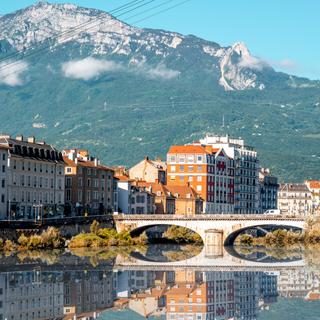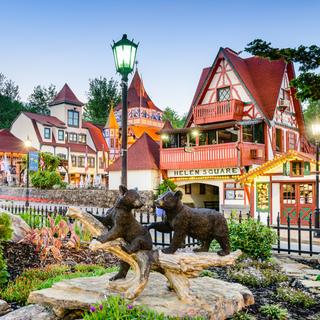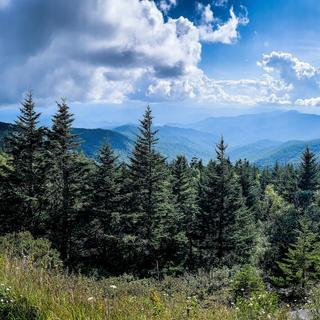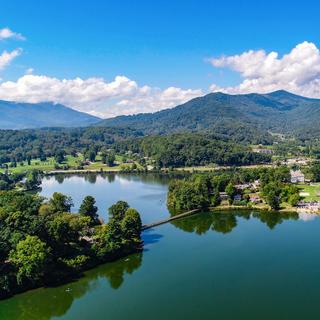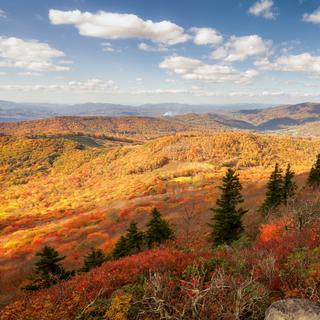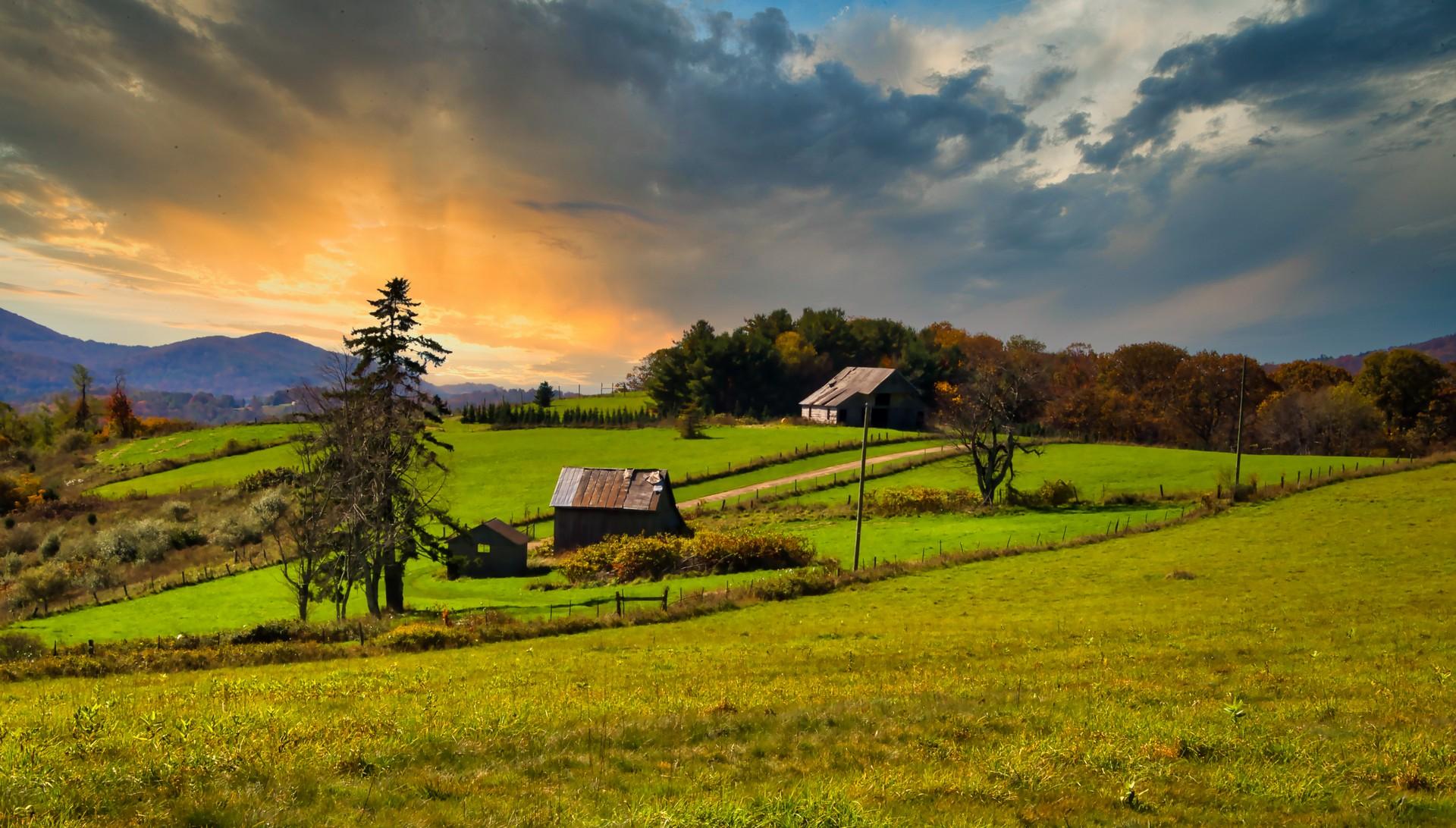
Blue Ridge weather and climate in 2026

Blue Ridge weather and climate in 2026
Day
12 °C
Night
-1 °C
Precipitation
138 mm
in month
Rainy days
11 days
in month
Daylight
11 hours
average
Sunshine
5 hours
average
Humidity
67 %
Weather charts for Blue Ridge
Destinations nearby and activities
Destinations nearby
Activities in Blue Ridge

Find more destinations like this
Destinations with similar weather to Blue Ridge
Other destinations in Great Smoky Mountains
Closest cities for Blue Ridge
Weather overview for Blue Ridge
Weather overview
Located in United States of America, the town of Blue Ridge enjoys a relatively temperate climate. Daytime temperatures fluctuate from a cozy 9 °C (49 °F) in the cool of January to a balmy 30 °C (86 °F) at the zenith of July. As night falls, thermometers dip to a brisk -3 °C (27 °F) amidst January's chill to a more comfortable 17 °C (63 °F) during July nights. Known for its drier autumn, October sees only 7 days of precipitation, while the summer month of July experiences the highest incidence of rainfall with 12 days. In taking a wider view, one can consider wind speeds peaking in January and sun hours progressively waxing and waning in accordance with the solstice cycles, delivering a perfect blend of weather conditions to the local environment.
January weather
The minimum daytime temperature of 9 °C (49 °F) is observed in Blue Ridge in January, accompanied by the lowest nighttime temperature of -3 °C (27 °F). The frequency of rainy days is gradually increasing to 12 days. The beginning of an uptick in the amount of cloudless sun hours starts to be noticeable. Wind speeds reach their apex during this month.
February weather
February in Blue Ridge reveals a nascent climb in daytime temperature to 12 °C (53 °F), while nocturnal temperatures exhibit a similar upwards trend. The peak rainfall for the month is recorded. Cloudless sun hours continue to ascend, now reaching 5 hours.
March weather
March witnesses a marked rise in daytime temperatures to 16 °C (61 °F) in Blue Ridge, and the increase in nighttime temperatures maintains consistency, now at 2 °C (36 °F). An ongoing rise in sun hours without clouds is also evident.
April weather
Blue Ridge is on the cusp of the tourist season as April sees a surge in day temperatures to 21 °C (69 °F). The nighttime warmth also rises, reaching 6 °C (43 °F). The onset of a decline in rainfall is noticeable, with the rainfall amount tapering down to 118 mm (4.66 in), and the decline in the number of rainy days starts to be observed at 10 days. The humidity also touches its annual low.
May weather
With the tourist season in full swing, there's a noticeable escalation in Blue Ridge's daytime readings to 25 °C (77 °F), continuing the upward trend for nighttime warmth at 11 °C (51 °F). A consistent growth in the number of cloudless sun hours registers at 9 hours.
June weather
The impending tourist season in June brings a further climb in day temperatures to 28 °C (83 °F) in Blue Ridge, matched by a corresponding rise in nighttime warmth at 15 °C (59 °F). The zenith of sunny hours can be seen in this month, totaling 9 hours. The pinnacle of daily daylight also becomes apparent.
July weather
The ongoing tourist season is marked by the maximum number of rainy days, reaching 12 days, and a noticeable uplift in rainfall amounts to 135 mm (5.33 in). The peak in nighttime temperatures is reflected at 17 °C (63 °F), and daytime temperatures also reach their zenith at 30 °C (86 °F). The initial decline in the number of sunny hours is observed at 8 hours.
August weather
As August arrives, there's a noticeable downtrend in daytime temperatures, yet the tourist season nearly peaks. Rainy days show a decrease to 10 days, and rainfall amounts slightly lessen to 115 mm (4.53 in). The wind speed hits its lowest point at 2, with humidity levels cresting.
September weather
September's daylight warmth experiences a gradual decline to 27 °C (80 °F) in Blue Ridge, while the initiation of nighttime cooling is marked by 13 °C (56 °F). The continuation of the tourist season is observed. The falling number of rainy days tallies at 9 days, and a corresponding descent in rainfall is noted. The diminishing sun hours continue in the pattern witnessed previously, now standing at 7 hours.
October weather
The tourist season proceeds in Blue Ridge with October's daytime temperatures continuing their retreat to a cooler 21 °C (71 °F), and the downward trajectory of nighttime readings evident at 7 °C (44 °F). The minimum in rainy days is also apparent, marked at 7 days. The least rainfall amount for the year is also visible, recorded at 96 mm (3.77 in). A sustained reduction in sun hours tracks on, reflecting a figure of 7 hours.
November weather
The beginning of the rise in rainy days becomes noticeable in Blue Ridge during November, with its count at 10 days, and a slight increase in rainfall numbers to 123 mm (4.86 in). The dwindling of daytime temperatures continues, and the progressive decline in nighttime temperatures also presses on, standing at 2 °C (36 °F). The decline in sunny hours mirrors previous tendencies, marked at 5 hours.
December weather
The progressive rise in rainy days carries on into December in Blue Ridge, reaching 11 days, alongside further amplification in rainfall volumes. The trend in decreasing daytime temperature mirrors that of the previous month, now showing a value of 10 °C (51 °F), with a continuous plunge in nighttime chills at -1 °C (29 °F). The minimal number of sunny hours is established at 4 hours, while the shortest day length of the year is evident at 10 hours.
FAQs
What is the coldest month in Blue Ridge?
January holds the title of the coldest month in Blue Ridge, with day temperatures plummeting to an icy 9 °C (49 °F).
How much does precipitation amount to in Blue Ridge during February?
February brings about the peak of precipitation with a total of 138 mm (5.42 in) in Blue Ridge.
What trend is observed in the amount of sunshine during March in Blue Ridge?
A continued upward trend is observed, with sun hours increasing to an average of 7 hours per day in March.
What change in humidity levels occurs in Blue Ridge during April?
April experiences the lowest humidity levels of the year in Blue Ridge, dropping to around 63 %.
Is May in Blue Ridge characterized by significant temperature variations between day and night?
May in Blue Ridge features a pronounced difference with warm days averaging 25 °C (77 °F) and cooler nights at 11 °C (51 °F).
How does the day length in June compare to other months in Blue Ridge?
June boasts the longest days of the year in Blue Ridge, with daylight stretching to an extensive 14 hours.
What kind of weather can be expected in Blue Ridge during the month of July?
July weather in Blue Ridge typically includes the year's warmest temperatures with highs at an average of 30 °C (86 °F) and the most rainfall, averaging 12 days of precipitation.
What is the trend for humidity in Blue Ridge during August?
August in Blue Ridge sees humidity levels peak, hitting a high of 77 %.
What can visitors anticipate regarding September's rainfall in Blue Ridge?
In September, visitors to Blue Ridge can anticipate fewer rainy days, with an average of 9 days experiencing precipitation.
Is October typically a dry period in Blue Ridge?
Yes, October typically features the least amount of precipitation in Blue Ridge, with an expectation of only 7 days with rain.
Does the amount of sunny hours diminish significantly in Blue Ridge throughout November?
Yes, November sees a significant reduction in sunny hours, with the daily average dropping to 5 hours.
What are the daylight hours like in Blue Ridge in December?
December days are the shortest in Blue Ridge, with daylight lasting typically for just 10 hours.



